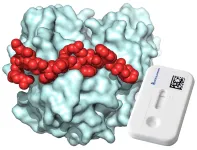(Press-News.org) First-generation bioresorbable vascular scaffolds (BVS) may be just as effective as drug-eluting metallic stents, which are currently the standard treatment for heart disease patients undergoing percutaneous coronary intervention (PCI).
These are significant findings from a global clinical trial led by a researcher from the Icahn School of Medicine at Mount Sinai. The work could lead to advancements and improvements in new BVS technology and future clinical use among interventional cardiologists across the United States.
This multi-center trial is the largest trial to examine the long-term safety and effectiveness of PCI using Abbott’s “Absorb BVS,” a novel stent made of absorbable polymer (plastic-like material).. It shows this treatment option, when properly implanted, may lead to long-term outcomes for heart disease patients that are similar to conventional treatment with metallic drug-eluting stents.
The five-year results from the “ABSORB IV” trial were announced Wednesday, May 17, in a Late Breaking Clinical Trials/Hotline session at the EuroPCR meeting in Paris, the official annual meeting of the European Association of Percutaneous Cardiovascular Interventions (EAPCI), and simultaneously published in the Journal of the American College of Cardiology.
“In this study, the largest ever of BVS in patients with coronary artery disease, the absorbable scaffold, when implanted with optimal technique, resulted in similar five-year rates of patient-oriented adverse events, quality of life, and recurrent angina as the standard metallic drug-eluting stent,” says lead author Gregg W. Stone, MD, Director of Academic Affairs for the Mount Sinai Health System and Professor of Medicine (Cardiology), and Population Health Science and Policy, at Icahn Mount Sinai. “Some adverse events with this thick strut first-generation scaffold were more common within the first three years, prior to its complete bioresorption. Thereafter, event rates were nearly identical with BVS and metallic stents. The early excess risk could likely be eliminated with an improved thinner next-generation scaffold and its implantation with intravascular imaging guidance, affording long-term restoration of the coronary artery to its original native state without a permanent implant.”
Dr. Stone adds, “There is a real desire among patients and their doctors for an absorbable stent which is present early while it is needed and then completely disappears. The favorable long-term results from this study emphasize the fact that this novel technology, which was voluntarily withdrawn from the market by the manufacturer due to lower than expected market adoption, should not be abandoned.”
Patients with coronary artery disease—plaque buildup inside the arteries that leads to chest pain, shortness of breath, and heart attack—often undergo PCI, a non-surgical procedure in which interventional cardiologists use a catheter to place stents in the blocked coronary arteries to restore blood flow. The standard treatment uses a metallic drug-eluting stent, and the permanent metallic implant effectively opens the artery. However, the permanent metallic cage may be responsible for the roughly 2 percent per year rate of adverse events that arise from the lesion every year for the life of the patient. Some of these events, known as stent thrombosis events, can cause a fatal heart attack in about 20 percent of cases.
For decades, manufacturers have been working on BVS made of a polymer (a type of plastic) as an alternative. These scaffolds open the blocked artery and then over a three-year period are safely absorbed into the bloodstream, where they are metabolized into carbon dioxide and water. The Food and Drug Administration approved Abbott’s “Absorb BVS” in 2016—the most widely used device of its kind—but the company voluntarily stopped manufacturing and sales.
The ABSORB IV clinical trial compared Abbott’s polymeric everolimus-eluting BVS, implanted with improved technique compared to prior studies, with Abbott’s cobalt chromium everolimus-eluting stents (CoCr-EES) to compare safety and outcomes over the course of five years following the procedure. Researchers randomized 2,604 patients at 147 sites with stable or acute coronary syndromes to receive either BVS with improved technique or CoCr-EES. Patients did not know which stent they received.
At the five-year mark, 17.5 percent of patients with BVS had target lesion failure (cardiac death, heart attack, or repeat intervention linked to the treated device or vessel), compared with 14.5 percent of patients treated with metallic stents—a 3 percent difference. Twenty-one BVS patients had thrombosis (blood clot) linked to the device, compared with 13 metallic stent patients, a 62 percent difference. The risk period for increased cardiac events was within the first three years, before the complete scaffold was absorbed into the bloodstream, but the rates of these cardiac events were similar between both groups from three to five years after implantation. At five years, there was no significant difference between the two groups in death or overall cardiac events, both groups had a similar quality of life (which was measured continually through the five year study period with the Seattle Angina Questionnaire (SAQ)-7 and the EuroQOL-5D Visual Analog Scale (EQ-5D VAS)) and there was no difference in chest pain symptoms.
A unique aspect of the study involved an in-depth look at recurring angina—chest pain—that is often the reason that patients undergo stent implantation. Around 5 to 8 percent of PCI patients typically report this symptom to their cardiologist at any given follow-up time. However, in this trial, researchers had patients in both groups answer detailed questions to characterize their chest pain symptoms continuously for up for five years post-PCI. The descriptions of these symptoms were reviewed by an independent committee to determine whether they were truly angina. This analysis showed 53 percent of patients in both groups (BVS and metallic stent) had recurring angina at some point within five years. This rate, much higher than previously appreciated, may give new insights into the burden of angina on patients and raises questions about the causes of angina.
“The fact than angina recurred so frequently was unexpected, and much higher than we would have anticipated given the fact that the patients and lesions treated in this study were not overly complex. This suggests that there may be causes of angina other than obstructive epicardial coronary artery disease, such as microvascular disease and vasospasm, that require different treatments than stents if we are to further improve patient’s symptoms,” says Dr. Stone.
This study was funded by Abbott.
About the Mount Sinai Health System
Mount Sinai Health System is one of the largest academic medical systems in the New York metro area, with more than 43,000 employees working across eight hospitals, over 400 outpatient practices, nearly 300 labs, a school of nursing, and a leading school of medicine and graduate education. Mount Sinai advances health for all people, everywhere, by taking on the most complex health care challenges of our time — discovering and applying new scientific learning and knowledge; developing safer, more effective treatments; educating the next generation of medical leaders and innovators; and supporting local communities by delivering high-quality care to all who need it.
Through the integration of its hospitals, labs, and schools, Mount Sinai offers comprehensive health care solutions from birth through geriatrics, leveraging innovative approaches such as artificial intelligence and informatics while keeping patients’ medical and emotional needs at the center of all treatment. The Health System includes approximately 7,300 primary and specialty care physicians; 13 joint-venture outpatient surgery centers throughout the five boroughs of New York City, Westchester, Long Island, and Florida; and more than 30 affiliated community health centers. We are consistently ranked by U.S. News & World Report's Best Hospitals, receiving high "Honor Roll" status, and are highly ranked: No. 1 in Geriatrics and top 20 in Cardiology/Heart Surgery, Diabetes/Endocrinology, Gastroenterology/GI Surgery, Neurology/Neurosurgery, Orthopedics, Pulmonology/Lung Surgery, Rehabilitation, and Urology. New York Eye and Ear Infirmary of Mount Sinai is ranked No. 12 in Ophthalmology. U.S. News & World Report’s “Best Children’s Hospitals” ranks Mount Sinai Kravis Children's Hospital among the country’s best in several pediatric specialties.
For more information, visit https://www.mountsinai.org or find Mount Sinai on Facebook, Twitter and YouTube.
##
END
Coronary bioresorbable scaffolds nearly as safe and effective as conventional metal stents for heart disease patients
2023-05-17
ELSE PRESS RELEASES FROM THIS DATE:
Evidence of ‘pandemic brain’ in college students
2023-05-17
COLUMBUS, Ohio – Decision-making capabilities of college students – including some graduating this spring – were likely negatively affected by the COVID-19 pandemic, new research suggests.
Students in the small study conducted by researchers at The Ohio State University were less consistent in their decision making during the 2020 fall semester compared to students who had participated in similar research over several previous years.
The researchers compared responses to a hypothetical situation made by students during the pandemic to responses made by students in earlier studies. They found evidence that students in 2020 ...
Researchers to advocate for fundamental science on Capitol Hill
2023-05-17
Researchers from universities across the United States will arrive at the U.S. House and Senate on Wednesday for meetings with lawmakers and their staffs about the importance of fundamental science and funding for the National Institutes of Health, the National Science Foundation and the Department of Energy Office of Science.
Their advocacy is particularly crucial this year in light of the current tense negotiations over raising the debt ceiling, which threatens non defense discretionary funding, including for scientific research, public health and many other aspects of federal government funding.
The researchers ...
Lesbian, bisexual women more likely to have worse heart health than heterosexual women
2023-05-17
Research Highlights:
In a study of nearly 170,000 adults in France, lesbian and bisexual women had lower cardiovascular health scores compared to heterosexual women.
In contrast, gay and bisexual men had higher ideal cardiovascular health scores compared to heterosexual men.
The study is the first to examine ideal cardiovascular health scores in sexual minorities.
Embargoed until 4 a.m. CT/5 a.m. ET Wednesday, May 17, 2023
DALLAS, May 17, 2023 — Lesbian and bisexual women were less likely to have ideal cardiovascular health scores compared to heterosexual women, which ...
Learning to save lives can start as early as age 4, according to new scientific statement
2023-05-17
Statement Highlights:
School-aged children are highly motivated to learn basic life-saving skills, such as recognizing a cardiac arrest, calling for help and performing cardiopulmonary resuscitation (CPR), according to a new scientific statement from the International Liaison Committee on Resuscitation (ILCOR), the American Heart Association and the European Resuscitation Council.
The statement identifies age-appropriate best practices to help children learn various skills that are part of the cardiac arrest chain of survival.
Teaching children about CPR at regular intervals as they age will develop their ...
Diagnosing inflammatory diseases with synthetic peptides
2023-05-17
Common inflammatory disorders such as ulcerative colitis and Crohn's disease can be diagnosed or monitored by measuring the protein calprotectin in stool samples, while serum levels of calprotectin could be used to monitor the inflammation status in rheumatoid arthritis. Calprotectin concentrations in patient samples are typically determined using antibodies that bind and detect the protein, e.g. in lateral flow assays like the now all-too-familiar home COVID-19 test kits.
But there is a problem with antibody-based calprotectin assays: the results can vary depending on the type of antibody ...
Study reveals cardiovascular health disparities based on sexual orientation
2023-05-17
In a recent nationwide study from France, lesbian and bisexual women had worse cardiovascular health scores than heterosexual women. The study, which is published in the Journal of the American Heart Association, also found that gay and bisexual men tended to have better cardiovascular health scores compared with heterosexual men; however, rural-residing sexual minority men had worse cardiovascular health compared with heterosexual men.
The study included 169,434 cardiovascular disease–free adults and assessed nicotine exposure, diet, physical activity, body mass index, sleep health, blood glucose, blood pressure, and blood lipids.
“Overcoming preventive ...
How well do interventions that include a case manager help individuals experiencing homelessness?
2023-05-17
A recent analysis of published studies examined a wide range of interventions that include a case manager to help individuals experiencing homelessness find stable housing. The analysis, which is published in Campbell Systematic Reviews, explored components most likely to lead to improvements in housing, health, and other outcomes.
In the analysis of 64 intervention studies and 41 implementation studies mainly from the United States and Canada, investigators found that any type of case management improves homelessness outcomes for people with additional support ...
How do combat-related injuries and their treatments affect bone health?
2023-05-17
Combat-related injuries to bone are common in military personnel and can lead to pain and disability. Results from a new study in the Journal of Bone and Mineral Research suggest that amputations for such injuries may negatively affect bone mass.
In the study of 575 male adult UK military personnel with combat-related traumatic injuries and 562 without such injuries, veterans who sustained traumatic amputations often had low bone density in the hip region. Changes in bone health appeared to be mechanically driven rather than systemic and were only evident ...
Changes to the diagnosis and treatment of COVID-19 in China throughout the pandemic
2023-05-17
An article in Health Care Science provides an in-depth analysis of the changes made to the diagnosis and treatment protocol for COVID-19 in China over the course of the pandemic.
The authors compare and summarize each of the 10 versions of the protocol issued by the National Health Commission of China over 3 years, highlighting the evolving scientific evidence and disease situation that informed these changes.
The summary provides valuable insights into the adaptive healthcare management and response to COVID-19 in China, which can inform the global response to the pandemic.
“Clinical ...
Does brepocitinib benefit patients with psoriatic arthritis?
2023-05-17
Brepocitinib is an oral drug that inhibits certain enzymes involved in inflammation—called tyrosine kinase 2 and Janus kinase 1—and is being tested for the treatment of several immunological diseases. A phase IIb randomized clinical trial published in Arthritis & Rheumatology recently generated promising efficacy and safety data for the use of brepocitinib in adults with moderately-to-severely active psoriatic arthritis.
Overall, 218 participants were randomized and received brepocitinib or placebo for 1 year. After 16 weeks of treatment, 30 and 60 mg daily doses of brepocitinib were superior to placebo at reducing signs and symptoms ...


